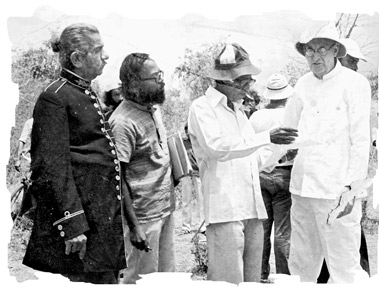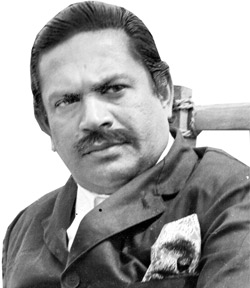|
Man preys on man:
A closer look at “The Village in the Jungle”
by Amal HEWAVISSENTI
|

Scenes from the film “The Village in the Jungle”
|
 The novel, “The Village in the Jungle” by Leonard Woolf is set in a
remote village in the southern part of Sri Lanka at the outset of
twentieth century. The novel is indeed a full-frontal dissection of
suffering and hardships of rural people being harassed by their fellow
men and nature. Though the Englishmen in London greeted his work with a
certain amount of appreciation, it was widely recognised in Sri Lanka as
the first ever realistic display of lifestyle of the downtrodden rural
people and tragedies that surround them. Woolf’s position in the Civil
Service (1904) gave him golden chances to explore the pathetic
dimensions of people and study the values and beliefs that had shaped
them. His short spell of stay in the country brought him in contact with
the miserable condition of rural people who were being ruthlessly
exploited by the local agents of western imperialism. Woolf’s is a
purely sardonic attitude to western imperialism and its local
representatives who are blindly executing “law” against “offenders.” In
short, the novel vividly mirrors the writer’s dissatisfaction with the
colonial system and it’s failure to grasp the needs and moods of rural
people. Here, Woolf’s tone carries a strong current of malice against
the inability of the existing imperial law to do justice for the
suffering people. The novel, “The Village in the Jungle” by Leonard Woolf is set in a
remote village in the southern part of Sri Lanka at the outset of
twentieth century. The novel is indeed a full-frontal dissection of
suffering and hardships of rural people being harassed by their fellow
men and nature. Though the Englishmen in London greeted his work with a
certain amount of appreciation, it was widely recognised in Sri Lanka as
the first ever realistic display of lifestyle of the downtrodden rural
people and tragedies that surround them. Woolf’s position in the Civil
Service (1904) gave him golden chances to explore the pathetic
dimensions of people and study the values and beliefs that had shaped
them. His short spell of stay in the country brought him in contact with
the miserable condition of rural people who were being ruthlessly
exploited by the local agents of western imperialism. Woolf’s is a
purely sardonic attitude to western imperialism and its local
representatives who are blindly executing “law” against “offenders.” In
short, the novel vividly mirrors the writer’s dissatisfaction with the
colonial system and it’s failure to grasp the needs and moods of rural
people. Here, Woolf’s tone carries a strong current of malice against
the inability of the existing imperial law to do justice for the
suffering people.
Apart from that the novelist’s treatment of people of the rural
society is both sympathetic and empathetic. He does not have the
narrowness in mental outlook in describing the people of Beddegama in
contrast to Robert Knox who was markedly prejudicial against Sinhala
people.
Bitter truth of jungle
The plot and action of the novel unfold against the background of
vast stretch of jungle which is the ground of struggle for survival. The
reader is left with the task of puzzling out the layers of meaning in
what the novelist says about the jungle ready at any moment, to intrude
on the village. “All jungles are evil, but no jungle is more evil than
that which lay about the village of Beddegama.” This strikes the keynote
of the “rule of jungle which is first fear and then hunger.” At the same
time, the novelist has a broadly focused view of the people in the
village.
“In their faces you can see plainly the fear and hardship of their
lives. They are very near to the animals which live in the jungle around
them. They look at you with the melancholy and patient stupidity of the
buffalo in their eyes or the cunning of the jackal.” It is blatantly
obvious to the writer that rural life is well beset with hardship and
suffering despite many fairy tales of their comfortable life in a
healthful surroundings.
Silindu’s family
 Silindu and his two daughters invariably rise to a heroic stature in
their lamentable struggle for survival against corrupt villagers and
nature itself. The “tikak pissu” father, Hinnihami and Punchimenika are
humanely tied together by unbreakable instinctive bonds. Silindu’s
relationship with and understanding of animals give him the idea that
animals have the right to live just as humans do. Though this small
family is labelled as “social misfits” by villagers, the father and two
daughters are clearly personalised by strong affection for each other,
familial love and honest feeling for their home. Silindu goes beyond the
bounds of convention by feeding his daughters’ minds with a culture of
folk tales, Buddhist parables, legends and beliefs that enrich their
upbringing. Silindu’s behaviour and attitudes set him apart from the
rest of the villagers and his daughters, unlike the girls, were brought
up with an intimate knowledge of the jungle. The villagers call him
“Tikak Pissu” because of the way he squats on the compound looking at
the jungle and his eccentricities like talking to animals while walking
in the jungle. However, the morally bankrupt Babehami, Punchirala and
Fernando play shrewd diplomatic games on him and black mail him in
different ways. His intense love for Punchimenika is made clear when he
gets to know Babun’s decision to marry her and bursts out. Silindu and his two daughters invariably rise to a heroic stature in
their lamentable struggle for survival against corrupt villagers and
nature itself. The “tikak pissu” father, Hinnihami and Punchimenika are
humanely tied together by unbreakable instinctive bonds. Silindu’s
relationship with and understanding of animals give him the idea that
animals have the right to live just as humans do. Though this small
family is labelled as “social misfits” by villagers, the father and two
daughters are clearly personalised by strong affection for each other,
familial love and honest feeling for their home. Silindu goes beyond the
bounds of convention by feeding his daughters’ minds with a culture of
folk tales, Buddhist parables, legends and beliefs that enrich their
upbringing. Silindu’s behaviour and attitudes set him apart from the
rest of the villagers and his daughters, unlike the girls, were brought
up with an intimate knowledge of the jungle. The villagers call him
“Tikak Pissu” because of the way he squats on the compound looking at
the jungle and his eccentricities like talking to animals while walking
in the jungle. However, the morally bankrupt Babehami, Punchirala and
Fernando play shrewd diplomatic games on him and black mail him in
different ways. His intense love for Punchimenika is made clear when he
gets to know Babun’s decision to marry her and bursts out.
“The girl is too young. I cannot give her to you, or evil will come
of it.”
Babun’s romance
Babun, a dispassionate young man in Beddegama is a relative of the
village headman and is in wild love with Punchimenika after observing
her from his compound. To him, the marriage with Punchimenika means
nothing more than having children by her and having his meals prepared
by her. She is naturally attracted to him through a complex
psychological instinct of fear and desire. As a result, Babun is beset
by a bombardment of fierce abuse and criticism by Babehami (Headman) and
other villagers for choosing a girl from a “rejected” family in the
village opinion. Babun says “I like no other woman... she is unlike the
other women of this village... in whose mouths are always foul words...”
He is by no means a type of man who is ready to bend personal opinion or
principles to the interests of the morally bankrupt superpowers in the
village.
What runs parallel to this drama is Hinnihami being sacrificed to
Punchirala, an evil looking, malevolent dealer in charms. The repellent
Vedarala tactfully employs superstitions and beliefs held by villagers,
specially Silindu to make the rebellious girl give into his marriage
proposal. Woolf says, “She was broken; tired and numb with fear and
despair... like a wild animal against a trap, she had fought against the
idea of giving herself to Punchirala.” However, disdainful she is of
Punchirala at first, she is forced to agree to marry him when his evil
course of action brings Silindu on the threshold of death. However, she
identifies herself with most evilpower and lets loose a torrent of
outbursts, “Are you frightened Punchirala? The binder of yakkhas is
frightened of Yakini.” Being an emotional wreck, she desperately breaks
away from Punchirala but ultimately falls prey to the sheer inhumanity
if man and his superstitious beliefs. She is destroyed not by devils
that her father had spoken of, but by evil plots by man himself. This
assuredly is the tragedy of the novel. Even her “son”, the fawn on whom
she has been so much emotionally dependent, is ruthlessly destroyed by
man’s inhuman attitudes.
Failure of Imperial Law
With alluring display of the power of money and promised life of
luxury, Fernando, assisted by Babehami make slow but evil plans to
seduce Punchimenika. As she is persistent in her loyalty to Babun, they
bring Silindu and Babun to the “White Hamadoru” of the court of
Hambantota, under false charges. Ratemahathmaya, a typically strong
believer in power and authority granted by colonial law, shows little
sympathy for the bareforked animal (Silindu)” squatting on the floor of
the judge’s bungalow. When the “Judge Hamadoru” releases Silindu and
orders Babun to rigorous imprisonment, Silindu, for the first time
realises that he has been hunted. Throughout judge’s long drawn speech,
Silindu’s mind goes totally blank and finally they find him snoring and
fast asleep on the ground.
This is a powerful illustration of imperialism in which a judge gives
a verdict on a man with a language he does not understand. Woolf’s
penetration of working of the mind of such a desperate man is really
marvellous. “They call me a hunter, a Vedda? To be hunted for years and
not to know it! It is the headman who is the vedda, a very clever
hunter... I am a buffalo wounded... A wise hunter does not follow up the
wounded buffalo where the jungle is thick...” There are Silindu’s words.
Silindu painfully realises that the depravity of the headman and the
lustful Fernando are responsible for the chain of unfortunate events in
which his family was gradually destroyed. He kills Babehami and Fernando
and goes straight to Ratemahathmaya. However, the judge, though totally
powerless against the existing colonial law, has a better understanding
of people like Silindu and sees through the sheer injustice done to them
by the machinery of law and corrupt officials. Woolf voices his theme of
man’s inhumanity to man through judge’s honest, analytical discussion
with Ratemahathmaya to whom the case seems to be simple. The judge’s
final remark coming from his moral conscience goes far beyond the scope
of legal machinery in operation.
“Savages you mean. Well I don’t know. I rather doubt it. I expect
he’s a quiet sort of man. All he wanted was to be left alone, poor devil
Ratemahathmaya, you don’t know the jungle properly...” They won’t touch
you if you leave them alone...”
Finally the village has changed beyond recognition and gradually
disappears into the jungle as an unmistakable offshort of corrupt forces
at work. No foreigner has shown more insight into the deep recesses of
suffering of people in rural areas as Woolf in his immortal prose.
|

